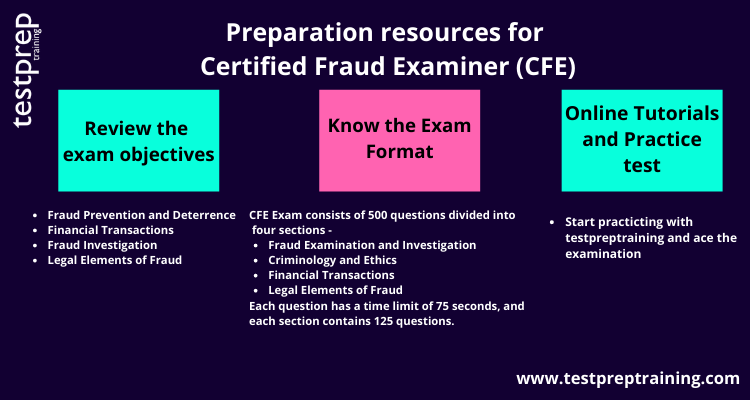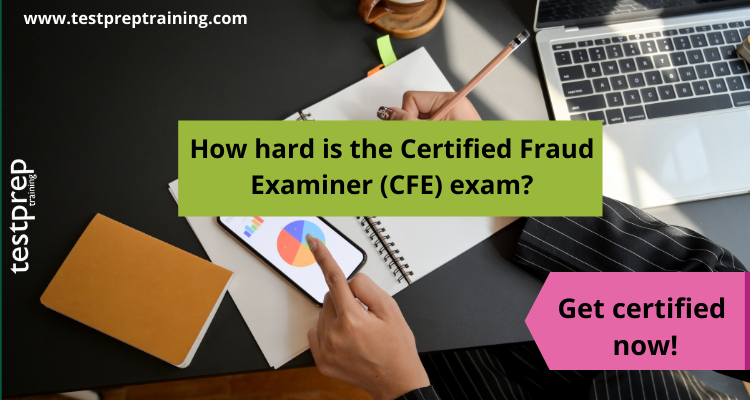Fraud is a pervasive problem in today’s world, with an estimated global cost of $5.127 trillion in 2020 alone. In response to this growing issue, organizations around the world are increasingly turning to Certified Fraud Examiners (CFEs) to help prevent, detect, and investigate fraud. However, becoming a CFE is no easy feat; it requires passing a rigorous exam that tests candidates’ knowledge and understanding of fraud prevention, detection, and investigation.
Many aspiring CFEs may wonder: how difficult is the CFE test? The answer to this question is not straightforward, as the difficulty of the exam can vary depending on factors such as an individual’s background and level of experience in the field. However, in general, the CFE exam is known to be challenging, with a pass rate of around 50-60%.
This blog post will explore the various components of the CFE exam, including the topics covered and the format of the exam, to provide a comprehensive overview of the exam’s difficulty. Additionally, we will provide tips and strategies for preparing for and passing the CFE exam, including recommended study materials and study habits. By the end of this post, readers will have a better understanding of what to expect from the CFE exam and how to set themselves up for success.
What is the Certified Fraud Examiner (CFE) Exam?
The Certified Fraud Examiner (CFE) is a certification given by the Association of Certified Fraud Examiners (ACFE). The ACFE is not just a certifying body; it also offers education and training on preventing fraud. With a membership of over 80,000, the ACFE aims to combat business fraud globally and foster public trust in professionalism, integrity, and objectivity. CFE training covers intricate financial transactions, forensic methods, law, and the resolution of fraud allegations. Lastly, fraud examiners are equipped to comprehend the reasons behind and the mechanisms of fraud.
Glossary for Certified Fraud Examiner (CFE)
- Fraud: Deliberate trickery carried out for personal benefit or to inflict harm on others.
- White-collar crime: Non-violent, financially motivated criminal activity that is typically committed by professionals or individuals in positions of trust.
- Financial statement fraud: Fraudulent misstatement or omission of financial information in order to deceive investors, creditors, or other stakeholders.
- Corruption: Abuse of power for personal gain or to give unfair advantages to others.
- Asset misappropriation: Theft or misuse of an organization’s resources, including cash, inventory, or intellectual property.
- Bribery: Offering or accepting anything of value in exchange for a favor or advantage.
- Money laundering: Concealing the proceeds of illegal activity by making them appear to be legitimate.
- Forensic accounting: The application of accounting principles and techniques to legal issues.
- Risk assessment: The act of recognizing and assessing possible threats to an organization.
- Internal controls: Policies and procedures designed to ensure the accuracy of financial statements and prevent fraud.
Exam preparation resources with links for Certified Fraud Examiner (CFE) Test?
The Certified Fraud Examiner (CFE) Test is a challenging exam that requires a strong understanding of fraud prevention, detection, and investigation. The following official resources can help you prepare for the exam:
- Association of Certified Fraud Examiners (ACFE) Study Materials: The ACFE offers a variety of study materials to help you prepare for the CFE exam, including online courses, self-study materials, and practice exams. You can find them here: https://www.acfe.com/study-materials/
- CFE Exam Prep Course: The ACFE also offers an online exam prep course that covers all four sections of the CFE exam. This course includes lectures, interactive exercises, and practice exams. You can find it here: https://www.acfe.com/cfe-exam-prep-course/
- CFE Exam Review Course: The ACFE also offers a live review course that covers all four sections of the CFE exam. This course is led by experienced fraud examiners and includes classroom instruction, group exercises, and practice exams. You can find it here: https://www.acfe.com/cfe-exam-review-course/
- Fraud Examiners Manual: The Fraud Examiners Manual is a comprehensive guide to fraud investigation techniques, methods, and procedures. It is an essential resource for CFE exam preparation and is available for purchase on the ACFE website: https://www.acfe.com/fraud-examiners-manual/
- CFE Exam Study Community: The ACFE offers an online study community where CFE candidates can connect with each other and share study tips and strategies. You can join the community here: https://community.acfe.com/home
- CFE Exam Calculator: The CFE exam requires the use of a calculator. The ACFE recommends using a financial calculator, and they have provided a list of approved calculators on their website: https://www.acfe.com/cfe-exam-calculator/
- CFE Exam Policies and Procedures Handbook: The ACFE provides a handbook that outlines the policies and procedures for taking the CFE exam. It is important to review this handbook before taking the exam. You can find it here: https://www.acfe.com/exam-policies-and-procedures-handbook/
Remember, passing the CFE exam requires a lot of dedication, hard work, and study. Utilize these official resources to help you prepare for the exam, and don’t forget to practice, practice, practice!
Certified Fraud Examiner (CFE) Course Outline
The Certified Fraud Examiner CFE exam sections include:
Financial Transactions and Fraud Schemes
- It tests the candidate’s comprehension of the varieties of fraudulent financial activities acquired in accounting records.
- Also, to claim Financial Transactions & Fraud Schemes, the candidate will be asked to illustrate knowledge of the subsequent concepts: fraud schemes, basic accounting and auditing theory, internal controls to prevent fraud, and additional accounting and auditing matters.
Law
- It ensures the liberties with the various legal divisions of managing fraud examinations, including rules of evidence, criminal and civil law, rights of the challenged and accuser, and expert witness concerns.
Investigation
Fraud investigation involves;
- Firstly, questions about taking statements
- Secondly, Interviewing
- Then, collecting information from public records
- Also, investigating illicit transactions
- Moreover, assessing deception and report writing
Use the study guide for preparing better for CFE Exam!
Fraud Prevention and Deterrence
- First of all, it tests the candidate’s perception of why people engage in fraud and approaches to prevent it.
- Also, Topics recounted in this section add white-collar crime, crime causation, occupational fraud, fraud risk assessment, fraud prevention and the ACFE Code of Professional Ethics.
How difficult is Certified Fraud Examiner (CFE) examination ?
With dedication and proper preparation, no exam is challenging. All you require for the Certified Fraud Examiner (CFE) exam is a reliable study guide. However, be cautious when selecting study materials. Some individuals in the Fraud Examiner Industry may claim that this exam is tough to crack. This perception often stems from a fear of putting in the necessary effort and hard work. But don’t be discouraged; we’ve compiled all the relevant resources to assist you in preparing and strategizing effectively. Let’s begin.

To know more details about the Certified Fraud Examiner (CFE) visit online tutorial by testpreptraining.com
Using the Fraud Examiners Manual
An outstanding reference guide to practice while exercising the CFE Exam Preparation Course is the Fraud Examiners Manual. The Fraud Examiners Manual serves as the standard reference for anti-fraud education, offering a comprehensive guide that details the most recent systems, techniques, methods, and procedures in fraud examination. Additionally, candidates can access and download it from the official ACFE page.
Discussion Forums
ACFE affiliates can visit the Certified Fraud Examiner CFE Exam discussion conference to post problems online and receive feedback from other members and ACFE staff. You should join some study groups where you can discuss the concepts with the people who have the same goal. This will lead the candidate throughout their preparation by covering the CFE syllabus. However, the discussion forums remain in the Members Only section of ACFE.com.
Discussion Forum: ACFE Discussion Forum
CFE Exam Coach E-Newsletter
Containing study suggestions, practice questions, tips from members who have already taken the exam, and more. This regular e-newsletter is a valuable instrument for applicants pursuing the CFE certification. Be certain to keep the email address updated with the ACFE to get this valuable tool.
Refer: CFE Exam Coach
Evaluate with Practice Test
When you are done with all your preparation it is always advisable to go for some mock test before you plan to sit for the actual examination. CFE exam sample questions will not only boost your confidence but will also make you aware of the weak portions in your preparation and which require some more focus and hard work. Taking real-time practice tests will also release you from exam fear and exam pressure. Start your learning with Free Practice Test now!



